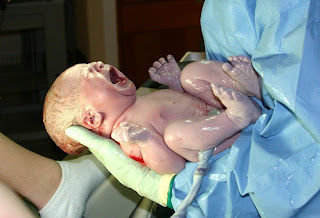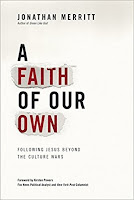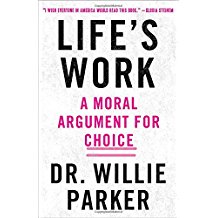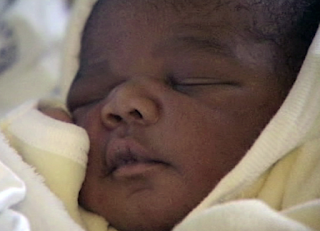Theology to Justify Abortion
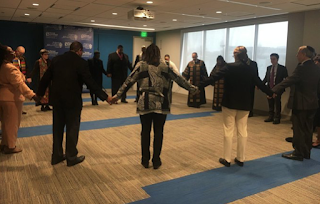 |
| Clergy blessing Planned Parenthood [2] |
(1 John 5:19b)
The occasion for my controversial remarks to a group of pastors happened shortly after the grand opening of the new Planned Parenthood facility in Eugene, Oregon. The mayor (the former head of the local Planned Parenthood organization) had been effusive in her praise of the work of Planned Parenthood. The ceremony was replete with all the trappings one might expect at the opening of a hospital or new school.
So a few days later, when I was attending the monthly meeting of the district pastors in the denomination I served for over thirty years, I brought up the very troubling article that was featured in the Register Guard newspaper titled “Local Clergy Persons Christen New Planned Parenthood facility.”[3] There was a picture of joined hands obviously belonging to clergy bedecked in clerical robes and, yes, they did in fact have some form of liturgical rite to “bless the ground” of a building that would be used to facilitate termination of babies.
When I voiced my concern to my fellow pastors about “christening” an abortion facility, nearly every one of them began to squirm and divert their eyes from me. The message was clear. “Don’t go there… Let’s talk about something else.” I then described what actually takes place in late term abortions, and not a few of my colleagues gave a look that said, “It’s inappropriate and I am offended that you would bring this up.”
These events marked my first exposure to the newly developing narrative—a postmodern theology that abortion is a rite of sacred choice and the abortion chamber is a sacred space.
 |
| Clergy statement blessing Planned Parenthood[4] |
Years later, we as a nation would be repulsed by the news that Planned Parenthood executives were being courted by pharmaceutical companies to sell the ‘products’ of abortion.[5] This is a sanitized way to refer to severed body parts and carefully preserved tissue. How would these evangelical ministers respond to the terrible facts?
The Emerging Evangelical Narrative
In 2014, my book, Fatal Drift… Is the Church Losing its Anchor? was released. In it I chronicled the rapid degradation of the very notion of such a thing as propositional truth. I cited as one example a book titled
A Faith of Our Own—Following Jesus Beyond the Culture Wars. The author, Jonathan Merritt, had impressive credentials. He was a contributor to Newsweek, has appeared on some national talk shows. His father is a former head of The Southern Baptist Convention.
Merritt’s book made the case for a postmodern, progressive makeover of evangelicalism—a kinder, gentler, more civil (he used that word a lot) conversation about what he deems to be the major Culture Wars issues. I wrote the following
One thought seems to repeatedly come out in the ‘conversation’ though, ‘Christians need to be silent about the so called ‘culture wars’ issues – cases in point – gay rights and abortion. Even the term ‘culture wars’ is probably the result of talking points created to silence the so called ‘religious right.’
Merritt’s book reflects a bias that it is the Christians who need to adapt, and that the poll he quotes makes a huge assumption that declining numbers in church attendance are the direct result of Christian involvement in politics. I would offer that there is another completely plausible explanation for the decline in attendance. It may well be that we are living in in the Last Days, and that a falling away that was prophesied in the Bible is taking place. It can also be that people are leaving churches because of liberal neglect of Biblical preaching.
Merritt’s position is that the debate about abortion and gay marriage is already over. The church has lost and it’s time to move on. Move on to what?
He along with other Emergent Church notables like Donald Miller (Blue Like Jazz) lecture Christians about become associated with political positions… all the while espousing their own very well defined and culturally accepted political stances on the very issues they cite as ‘divisive’.
Here is why I think this is this occurs. A detailed discussion about poverty will not cause offense. Becoming an activist against the proliferation of nuclear weapons will not result in one being labeled as a controversial ‘culture wars’ combatant, for this issue aligns with the current progressive narrative, and does not require identification as a person who believes that the Bible speaks with authority about the ‘other’ issues.
The Emerging Theology for Abortion
Recently I read a book titled Life’s Work—A Moral Argument for Choice by Doctor Willie Parker (Atria Books, 2017). (See the recent Herescope post Oprah Magazine: God’s “in” Abortions?)
In his opening remarks Dr. Parker gives a clue as to his philosophy. He will conclude his book with a case for a Theology of Abortion. It is a fair assessment that Dr. Parker equates the women’s right to choose with the Civil Rights movement. He also makes it a point to state numerous times that he has no sentimental notions about the fetus (the baby):
“I do not engage in or perpetuate any of the culture’s sentimental notions about the primacy of motherhood in womens’ lives; I regard the meeting of sperm and egg as a biological event no less miraculous but morally qualitatively different from a living, breathing human life, imbued with sacredness only when mother or the parents, deem it so.” (p. 14) [emphasis added]
Perhaps most striking to me is the author’s ‘testimony’ of being born again and filled with the Holy Spirit and claiming to be called by God to abort babies. After giving a detailed account of his conversion, he goes on to relate a very telling incident:
“In the years since my Issues & Values paper [in which he espouses the view that abortion is a ‘black and white’ issue, ed.], I had become sexually active, and for the first time I had to cope with the emotionally fraught aftermath of a broken condom. My girlfriend at the time, an ambitious woman with her sights on a very competitive residency, made me promise tearfully that if she became pregnant I would support her decision to terminate the pregnancy and not ask her to bring a fetus to term. She had worked hard all her life and wanted to become an orthopedic surgeon more than anything. Moved by her anxiety that I might fail to be a loving support to her, and my own strong desire to defy the stereotype of the sexually irresponsible black man (even though nothing in my personal history indicated that I might conform to it) I easily agreed—an agreement that cost me nothing because she did not become pregnant.” (p. 25)
He goes on,
“It is a testament to the strength of my Christian faith that it took me so long to revise my stance on abortion, for the seeds of my personal revolution were in me from childhood.” (p. 26)
As I read this I found myself thinking, “Where was the strength of his Christian faith when he had sex outside marriage?”
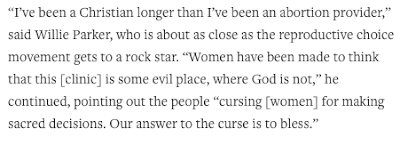 |
| Dr. Willie Parker’s ‘sacred decision’ abortion theology[7] |
Abortion as Liberation Theology
I noticed that throughout the book, Dr. Parker’s statement of Christian faith is mentioned in parentheses or coupled with some kind of disclaimer. For instance, this is how he responds to what he called Pentecostalism:
“That was a miracle That same understanding informs my approach with my patients. As they feel compelled to explain themselves, to rationalize their abortion decision, they often feel the need to invent a narrative that makes them appear virtuous, or that cleans up the details of their circumstances in order to evoke my compassion… When I sense this, I tell them of my understanding (though I keep God out of it) ‘Your need makes you worthy You are fine the way you are.’ Mike [his former pastor, ed.] taught me that if invited it to happen, I could be baptized in the Holy Spirit—Speak in tongues, and heal the sick and cast out demons and more; that the Spirit would lead me toward the most Divine version of myself.” (p. 122)[emphasis added]
This use of Christian language to defend abortion occurs throughout his book. Case in point Dr. Parker’s take on the Good Samaritan:
“It was like a punch, at once in my spiritual gut. The Scripture came alive and it spoke to me. For the Samaritan, the person in need was a fallen traveler. For me it was the pregnant woman. The earth spun and with it this question turned on its head. It became not: Is it right for me to perform abortions? But rather: Is it right for me as a Christian to refuse to do them? And in that instant, I understood that I, like the Levite and the priest, had been afraid—afraid if what my Christian brothers and sisters might think of me.” (p. 36)
Later on in his book he describes what he glibly referred to as being “born again from being born again” (p. 204) [emphasis added].[6]
Citing Dr. Martin Luther King, Jr., Dr. Willie Parker writes,
“I read Dr. King and then I read the books Dr. King had read, the twentieth century theologians who built a progressive Christianity that put God at the center of history and made justice God’s priority: Reinhold Niebuhr and Paul Tillich who led me to a more complex understanding about moral absolutes. I read their forbears, Hegel and Schleiermacher and Kierkegard.
It was as if I could feel my mind expanding—exploding—with each book. I began to understand that I had to find a thinking person’s religion or abandon God entirely. My mentor in this journey toward a broader understanding of Christian identity was another Mike, a former Roman Catholic priest named Mike Rivage-Seul. Mike was a professor at Berea who taught Issues and Values, that course I loved….
Ordained around the time of the Second Vatican Council a period of upheaval in the Church, Mike had left the priesthood and fallen in love with a woman and married her—though his commitment to his faith stayed strong. As his faith evolved, Mike became devoted to liberation theology, a re-articulation of the gospels’ message on radical love for the poor and the marginalized.” (pp. 166-167) [emphasis added]
From a basis of a faith of his own (to borrow Merritt’s phrase) Dr. Parker would go on to justify abortion on demand as a remedy for relieving the psychic pain of the mother—a palliative measure in his eyes.
But his new theology of abortion is not new at all. It is classic Liberation Theology cast in the mold of Rev. Jeremiah Wright and Father Pfleger, President Obama’s spiritual mentors during his community organizer days in Chicago.
Dr. Parker’s final paragraphs sums it up well. In his worldview the bloody procedure room has been redefined as a sacred space, and the grisly act is a sacred choice that is “like God.” Observe his theology:
“Is God vested one way or another in whether you as an individual, become pregnant? No. Is pregnancy sacred because there will be a baby, ultimately in a bassinette, beautiful, maybe the next Obama? No. The process is bigger than you are. The part of you that is like God is the part that makes a choice. That says, ‘I choose to.’ Or ‘I choose not to’ That’s what’s sacred. That’s the part that’s like God to me.
The procedure room in an abortion clinic is as sacred as any other space to me because that’s where I am privileged to honor your choice. In this moment where you need something that I am trained to give you, God is meeting us both of us where we are.” (p. 212) [emphases added]
The Contrast Between Two Lives
As I wrote this article there was something in the back of my mind… rather, someone. It is another African American doctor of some note who also has a testimony of being born again. He, like Dr. Parker, came from a similar background of poverty and faced daunting challenges.
His mother was raised in Tennessee in a very large family and dropped out of school in third grade with limited prospects. She married (at age 13) a man who turned out to be a bigamist, who left her as a single mom with two children. Although she herself couldn’t read she insisted that her two boys get two library books each and read and submit written reports.
One of her sons had huge anger issues—stories of attacks with hammers and one instance of a stabbing. That boy, terrified by what he did, called out to God. He went on to achieve unimaginable heights.
At age 32, he became the youngest Director of Pediatric Neurosurgery in American History. He is famous for successfully separating twins that were conjoined at the head. He went on to run for President. He is now the Secretary of the Department of Housing and Urban Development.
Dr. Ben Carson would never have been born had his teenage mother landed in a Planned Parenthood consulting room. The millions of lives he will influence in his current role would be denied the gifts he brings. His life’s work would have never taken place. Dr. Ben Carson has no hesitation whatever giving all the glory to Jesus… Not the Jesus of Liberation Theology… No, the only begotten Son of God. The only real answer for all those who face an unplanned pregnancy.
and hath given us an understanding,
that we may know Him that is true,
and we are in Him that is true,
even in his Son Jesus Christ.
This is the true God, and eternal life.
Little children, keep yourselves from idols.
Amen.”
(1 John 5:20-21)
Ed Note: The reader is reminded of what was stated previously in an article on this same topic:
Having quoted Parker, it needs to be stated that while the “act” of abortion is outside of God’s love neither the aborted baby nor mother are outside of God’s love. In the traumatic aftermath of having aborted a baby, many women have found forgiveness in and through the Cross of Jesus Christ (Romans 3:23; 1 Timothy 1:12; 1 John 1:7-9). Further, we harbor no personal malice toward Dr. Parker nor do we wish for any harm to come to him because he is an abortion provider. God is his judge, and along with the rest of us, Jesus will judge all of us (John 5:25-29).
Endnotes:
1. Micaiah Bilger, “Religious Leaders Bless Opening of New Planned Parenthood Abortion Clinic, Call It ‘Sacred Work’,” Life News, Jan. 12, 2017, http://www.lifenews.com/2017/01/12/religious-leaders-bless-opening-of-new-planed-parenthood-abortion-clinic-call-it-sacred-work/
2. Image adapted from image posted at Dave Urbanski’s article, “Clergy members bless new Planned Parenthood Clinic: ‘God let your spirit rest upon these caregivers’,” The Blaze, January 13, 2017, http://www.theblaze.com/news/2017/01/13/clergy-members-bless-new-planned-parenthood-clinic-god-let-your-spirit-rest-upon-these-caregivers
3. See endnote 1 above for a description of a similar ceremony.
4. Micaiah Bilger, “FBI May Launch Criminal Investigation of Planned Parenthood for Selling Aborted Baby Parts,” Life News, September 29, 2017, http://www.lifenews.com/2017/09/29/fbi-may-launch-criminal-investigation-of-planned-parenthood-for-selling-aborted-baby-parts/
5. Emphasis added. Image adapted from the article by Micaiah Bilger, “Religious Leaders Bless Opening of New Planned Parenthood Abortion Clinic, Call It ‘Sacred Work’,” Life News, Jan. 12, 2017, http://www.lifenews.com/2017/01/12/religious-leaders-bless-opening-of-new-planed-parenthood-abortion-clinic-call-it-sacred-work/
6. Ed note: This phrase aptly describes the downgrade, totally upturned on its head, transformation described in the first chapter of the book of Romans.
7. Quote obtained from Dave
Urbanski’s article, “Clergy members bless new Planned Parenthood Clinic:
‘God let your spirit rest upon these caregivers’,” The Blaze, January 13, 2017, http://www.theblaze.com/news/2017/01/13/clergy-members-bless-new-planned-parenthood-clinic-god-let-your-spirit-rest-upon-these-caregivers
Sources for this article included:
http://www.newsmax.com/FastFeatures/willie-parker-abortions/2015/05/27/id/646983/
http://www.salon.com/topic/dr_willie_parker/
http://www.wbur.org/hereandnow/2014/08/11/abortion-doctor-mississippi
http://www.newsweek.com/christian-doctor-willie-parker-abortion-provider-choice-book-580142
http://www.esquire.com/news-politics/a23771/abortion-ministry-of-dr-willie-parker-0914/

